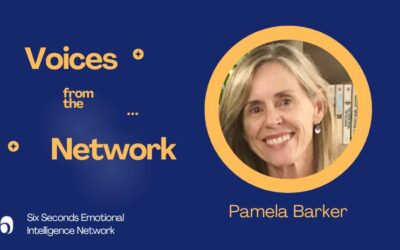Love Thyself.
The power of

Self-Compassion
Today, in the age of optimization, a time when we’ve been told it’s essential to get the very best from ourselves; we’re circling round and round the ambition, like dogs chasing our own tails. This desperate need for accomplishment is defeating.
What can we do?
The surprising answer:
Be compassionate… not just to others, but starting with yourself.
Why do we need self-compassion? It seems to me that we already have a perfectly good set of faculties for work, personal achievements and self-realization. Our changing, growing brains have triggered the technological and social changes which gave rise to modern society. If your life is anything like mine, it will resemble a fascinating, detailed, varied canvas, marred only by two things: the random, misshapen holes of simple bad luck, and the hurried brush-strokes of my imperfections.

Where do we go from here?
There’s a growing body of research
showing that Self-compassion (an essential to wellbeing) unlocks us from our tail chasing.
Continue your learning by practicing EQ for wellbeing
Self-compassion
is Good Stuff
- Self-compassion reduces risks of anxiety and depression .
- Self-compassion is linked to health-promoting behaviors related to eating, exercise, sleep and stress management .
- Self-compassion for students is linked to better study habits, healthy risk taking and achieving long-term goals .
- Self-compassion helps people emotional well-being after adversity – such as divorce, cancer, or PTSD .
-
(source)

Self-compassion
is
Developing
Empathy for
Ourselves
Let’s look at some ways to cultivate self-compassion and practice skills that re-direct us away from negative thinking, taking on blame, or regretting past choices. Then we can focus instead on being genuinely nice to ourselves, and choosing the positive path. Let’s remember this set of skills with the acronym: PLACES
P
Positive
Self-Talk
I’ve been making an effort to seek out and find good news recently.
I’m not talking about the clichéd local stories of cats being rescued from trees. Consider instead that several rare animals were recently removed from the Red List of endangered species, or that, recently, for twenty-four hours in an island across the Atlantic Ocean, not a single ounce of coal was burned to make electricity. There are plenty of reasons for optimism, but they can be hard to find amid the din.
I deliberately seek out these stories because it’s often difficult to find the positive from within ourselves. To see the glass as half full, rather than half empty, takes a special willingness to accept one form of perception, and reject another.
Research shows that most of us don’t laugh much when by ourselves.
Given that many people live alone, or work from home (generally in silence), this might be something worth addressing. Happily, the Internet has become a ceaseless source of amusement, from cat videos (go on, treat yourself) to late night TV shows (depending on your tastes, and how much political satire you can handle at the moment). It’s perhaps worth counting how many times you laughed in a day, and the origin of the feeling; was it something you read, something on the radio, or just one of those funny thoughts that arises out of nowhere? Track this a little, and
try to put yourself in more situations where laughter is likely.
L
Laugh
Often
A
Advice
From
Myself
This boils down to “absorbing ‘wisdom.”
My family life was enlivened this past year by the presence of my grandniece, and I often enjoyed the advice she would dispense to me off and on. It had a youthful zing to it that I might not have considered. We can often get stuck in our own rumination, and tread the same path over and over and over. Sometimes, I find it helpful to say to myself, if my friend called with this problem, “What would you suggest she might try as a solution?” When I re-frame the situation through my friend, suddently it is not my problem, it becomes easier to gain perspective and to generate multiple “out of the box” solutions. If others seek out and value our opinion, it must be worth something right?
It seems logical to value our own advice. We can all do better by listening carefully to ourselves.
I begin the day with a list of “Things to Do,”
but my list is written compassionately. Years ago, I decided that noting down everything which was awaiting my attention just left me feeling swamped and impotent. Instead, I choose a smaller number of carefully prioritized tasks, estimate how much time they will take, and then figure out how to tackle them creatively.
This eliminates much anxiety and stress. Instead of slaving away at the computer, trying to write a lecture or a paper, I might wander around my garden for a few moments, letting the ideas flow. I might call a friend for some pointers, or read similar papers by others, but I always try new ways of conceptualizing the ideas and noting them down. I’m no artist, but mind maps are an excellent way of doing this. One technique I find useful
is to jumble together disparate ideas and see how I might cluster them to generate something original.
C
Celebrate
Challenges
You Find
E
Exercise
Our
Optimism
I have friends who suffer terribly from stress,
and one recently told me that the worst possible thing to say is, “Don’t worry.” She said worrying seems the most reasonable, sensible thing in the world (at least, in her mind) because the issues were truly overwhelming. At the same time, she has a keen, scientific mind, and approached her worries logically. So, I introduced her to the idea of applying TIE. In what ways are her problems Temporary? This made sense to her, because even if in the short-term, the challenge was devastating, the results will naturally dissipate with time.
Also, many of our problems are also Isolated; even if they feel like a cluster of weights on our shoulders, they’re largely independent of one another, and can be assessed and treated separately.
Such assessment requires concentrated Effort; I encouraged my friend to do something to combat at least one of her issues every day. She joined a meditation community (two days a week), tried running around a nearby lake (three times a week), and joined an intensive writing group called ‘Shut Up and Write’ (twice a week). She was amazed—she felt better. As a scientist, she recognized from the outset that
no effect happens without a cause, and took responsibility for creating it.
I found myself strapped into a rollercoaster at an amusement park.
This isn’t my usual thing at all, but my niece wanted to go, and so there we were, ready for the clanking ascent to a dizzying height, and then the inevitable spins and twists. While waiting in line, I thought about my niece, how she’d be scared but excited, and how I’d like for this to be a memorable experience for her. So, as the vehicle started to move, I shouted out over the noise, “Remember to pay attention!”
For many of us, the happiest moments of life threaten to slip past almost unnoticed. Weddings are stressful, as well as joyful. Births are ten times so, in both respects. Giving a concert or a lecture can feel like a tightrope walk where our only focus on getting to the end without making a mistake. Throwing a party should be a chance to connect and enjoy our friends, but we’re distracted by whether the artichoke dip has enough salt, or whether there’s enough parking for everyone.
“Paying attention to now” has limitless applications, but I’d recommend special events as a good place to start practicing paying attention. What is everyone wearing? What facial expressions are they making? How do they seem to feel? I value my friends and family enormously, and I actually think in advance what to ask them about – college, kids, moving house, travels – because I know I’ll forget once there are a dozen people in my house.
Or traveling? How many times have you seen a busload of people arrive at a monument, get out, take pictures, and then get back on the bus? I mean, it seems like the natural thing to do, but I have a different view: just stand there and breathe it in—pay attention now. Mark this experience as different from the others; give it a luminous, attentive quality which will imprint the place on your mind. Take in every aspect of the rock formation, the painted ceiling, the ballet performance, the child’s recital—pay attention now. Breathe in the uniqueness of it, whatever it might be, and resolve to focus purely on what’s in front of you . In those moments, there can be no worries about the past or future, because there is no cerebral real estate available to them;
instead, our whole beings reside in that given moment.
S
Savor
the Special
Moments

One final
takeaway on
Self-compassion
I confess that I’m a human, and so, unlike a computer, I can’t be optimized for the most efficient performance. And instead of lamenting my sub-optimal faculties and habits, I choose to celebrate my creativity, make myself laugh, connect with others and be proud of what I have achieved . Self-compassion flows in part from closing the door on negative voices; I recognize them, categorize or label them, and then listen to something else – birdsong, music, the radio, or the positive voices telling me to keep going, and that everything with some effort and energy on my part will be better.
Continue your learning by practicing EQ for wellbeing
What’s new in emotional intelligence?
From Enemy to Ally: How Eric Pennington Changed His Relationship with His Own Emotions – and Found His Life’s Purpose
How emotional intelligence helped Eric Pennington transform corporate life setbacks into strengths – and find purpose in both work and life.
Helping Others Achieve Overall Well-being and Healthy Connections: How Emotional Intelligence Guided Pamela Barker’s Career Path Growth
Pamela Barker’s journey began with healing bodies, but it was her discovery of emotional intelligence that unlocked her true purpose: helping others achieve overall well-being and healthy connections. From her days as a physical therapist to becoming a passionate EQ coach, Pamela’s story is one of transformation, resilience, and the power of connection. Her experience shows that real change starts from within.
Harnessing Emotional Intelligence: How Sara Canna Supports Employees and Transforms People’s Lives at the World Health Organization (WHO)
Emotional intelligence is more than just a buzzword—it’s a transformative tool that can reshape how we navigate challenges, build relationships, and thrive in demanding environments. Discover how Sara Canna brought EQ to the World Health Organization, empowering employees to manage change, stress, and personal growth.
From Corporate Consultant to Coach: Elise Jones’ Emotional Intelligence Journey-Voices from the Network
Elise Jones transformed her career by embracing emotional intelligence, shifting from a corporate consultant to a passionate EQ Coach. Through authentic connections, she found deeper fulfilment, proving that strong relationships are key to a happier, more meaningful life.
Want to Manage Your Emotions More Effectively? Find Time to Journal About Challenging Experiences
Daily journaling to reframe unpleasant events can significantly reduce depressive symptoms, lessen stress, and increase life satisfaction.
A Journey through Empathy & Optimism: Amy Jimison in Voices from the Network
When you feel stuck and can’t see a way out, how do you navigate change? Certified Coach and leadership expert Amy Jimison shares her approach.
- 87 Ways to Be Kind and Loving - June 27, 2022
- 13 Tips to Reduce Stress & Anxiety During Covid-19 - April 8, 2021
- 6 Tips for Making the Best of Your Reality - October 12, 2020








I was searching for an article to provide to my parents and teachers on self-compassion and this truly was a gem for meeting that need. It will also serve to guide my own journey of self-compassion. I have shared the link with staff; however, a pdf copy of article would also be helpful for sharing with my parents. I serve a large bilingual community and having the article in spanish would also be greatly appreciated. Thank you
What a beautiful, beautiful, just beautiful article!!! LOVED it and it makes so much sense! We are told, we read and etc to be compassionate to others but rarely does anybody tell you that you must be compassionate to yourself. Love the colour scheme, it is so uplifting and the language is so free flowing!!! JUST LOVED IT!
1 request: Would it be possible to get this article in a pdf format so I could share it with all Colleagues in my organization. in these challenging times, it will definitely be useful. I will definitely also be sharing the link for this wonderful article.
Hi,
Truly motivating article Anabel. You have a gift for saying wonderful things. Thank you.
Hi, It’s difficult to read script that is white on a pale background. I enjoy this site – thank you – could you please consider readability so that all content can be accessed with ease.
Thanks.
This was a beautiful, well written and emotionally uplifting article. The colors and pictures were so well chosen.
thank you for doing this.
Very good insight!!
Self-compassion, just like any other feelings and emotions, i. e., self-love, self-respect and much more “Self-…”, should and must start from the self before it ever gets out to anyone. As we all know quite well, it’s virtually NOT possible to give anyone anything without first possessing it OURSELVES and this is universal whatever your beliefs are, your colour, your formal and informal education you’ve received, your language for the universal language is all these so-called
“Self- …” etc.
– – – – – –
Ross Galán, Ph D
NLP Spiritual Life Coach
I guess if we don’t build it inside ourselves, it’s hard to share it with others, right Ross?